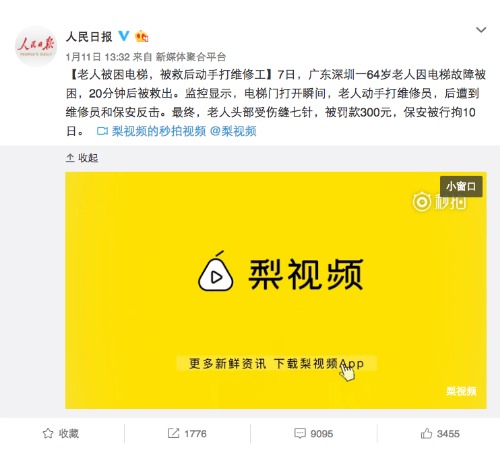China Digital
The Rise of Pear Video (梨视频): Making Short News Videos Trending on Chinese Social Media
Pear Video (梨视频) is the new kid on the block in the pool of China’s many digital news platforms.
Published
8 years agoon

Pear Video (梨视频) is the new kid on the block in the pool of China’s many digital news platforms. Its rise is noteworthy as it comes at a time when authorities are strengthening regulations on the media sharing ‘non-official’ news videos. Does Pear Video show the way China’s new media is going?
Over the past few months, the promotion and popularity of Chinese video news platform Pear Video (梨视频) has been exponentially growing on China’s various social media platforms. Its rise is noteworthy, especially after Chinese authorities announced new regulations concerning the sharing of ‘unofficial’ online news videos in December of 2016.
According to The Guardian, the new regulations block public (media) accounts on platforms such as WeChat and Weibo from (re)posting “user-generated audio or video” (Haas 2016).
Chinese media sources (e.g. Sina News) reported that these regulations are specifically about user-generated news that focuses on current politics “and such.”
Short videos have become an increasingly popular tool in the world of Chinese media, with short news video platforms like Kanka News (@看看新闻) having thousands of followers on Chinese social media.
WHAT IS PEAR VIDEO?
“China’s leading short news video platform.”
Pear Video calls itself “China’s leading short news video platform” (梨视频是中国领先的资讯短视频平台). With an app and ultra-short informative news clips, it is a digital video platform that is specifically aimed at mobile users.
The company was established in September 2016. It was founded by Qiu Bing, former CEO of Chinese media outlet The Paper. In its official description on its website and Facebook, it states that it has received an investment of over one hundred million RMB (±14.4M$) by China Media Capital, and that its team consists of over 200 members, allegedly producing 200 news videos every day.
The company also states that its team members come from media companies such as, among others, The Paper (澎湃) and the Shanghai Media Group.
Pear Video’s clips often, even daily, make it to the top trending lists of Sina Weibo, recent examples being the video about a pet dog killed by a local guard, a clip on pole-dancing girls at a Taiwanese official funeral, or the report about a man injured during the anti-Japanese protests of 2012.
Pear Video mainly focuses on society, entertainment, and tech news. Besides the more local news, Pear Video also reports on international news, such as developments regarding Trump and Jack Ma, or more marginal news that has become trending in Europe or America.
Pear Video currently has a fanbase of 340.000 on its official Weibo account, but since they are also active on WeChat, their own app, Facebook, YouTube, and other social media platforms, the company currently has a reach of millions – and is growing explosively.
The formula is clean and simple: Pear Video brings news in short edited clips, usually less than a minute, showing news footage and audio with bold captions that explain the background and news value often accompanied by music. The news is easy to digest, very contemporary, and with its trendy design is especially appealing to China’s younger generations.
On Sina Weibo, Pear Video broadcasts its videos through short-video app Miaopai, that partnered up with Weibo in 2013 for easy audiovisual content sharing on the Sina platform.
BEHIND PEAR VIDEO
“The face of commercial media and the heart of Party media.”
In many ways, the launch of Pear Video is similar to the 2014 launch of The Paper, a newspaper directed at China’s younger generations. In 2015, Tabitha Speelman wrote about this new Chinese web-based media outlet in Foreign Policy, calling it a “smarter, sexier” form of state media that adhered to government calls for more “proactive” and “effective” ways of bringing news in a changing media environment.
David Bandurski, editor of the China Media Project, wrote an insightful piece about The Paper in 2016, in which he quoted former Southern Weekly journalist Fang Kecheng in saying that The Paper “has the face of commercial media, and the heart of Party media.”
Bandurski linked the launch of The Paper to China’s new “internet management path” that became apparent at the Wuzhen Summit. Unsurprisingly, its initial funding of 100 million RMB (±14M$) came from the Shanghai United Media Group (SUMG): a state-owned media group. “Propaganda 2.0”, is how the Economist called it.
Seeing the launch of The Paper in the same light as Pear Video – a fresh, new, cross-media 21st-century news platform – it seems that the two media platforms are walking a similar path in making China’s ‘official’ news more appealing to younger audiences.
But there is one slight difference. Although Pear Video’s team also comes from The Paper and from the state-run Shanghai United Media Group, its funding comes from China Media Capital (CMC), a private equity and venture capital firm headed by Li Ruigang. Although not state-owned, it is nevertheless a company that is also backed by the state.
In July of 2016, China’s media regulators called for a development of more powerful media organizations to make more of an impact, not just within but also outside of China, to compete with foreign ones. According to Patrick Frater (Variety 2016), the need for more influential media meant a growing government support for private-sector companies, like China Media Capital.
The establishment and rising popularity of Pear Video coincides with both the official call for more media giants – CMC financed Pear Video within months after this call – and the announcement of new media regulations on the sharing of ‘non-official’ news, after which the big state media outlets like People’s Daily (nearly 50 million followers on Weibo) also started sharing Pear News video on its official account on a daily basis.

People’s Daily now posts Pear Video news content on a daily basis.
Popular news accounts like Sina Video (@新浪视频) also shares their videos, and other short video news accounts such as Weila Video (@微辣Video) or Yishou Video (@一手视频) now seem to have merged with Pear Video and only post Pear Video content on their accounts, making their audience grow even bigger.
With so many official media sharing Pear Video content, and their videos making it to the Sina Weibo top trending lists on a daily basis, it is apparent that the Pear Video cross-media platform has the full support of China’s cyberspace authorities.
THE FUTURE OF CHINESE NEWS MEDIA
“This is the mobile social media generation that rather watches the news than read it – making short videos all the more influential.”
“Short news videos may be a new weapon in the spread of new media,” People’s Daily wrote in September of 2016, the month of Pear Video’s launch. The article notes that in the era of “mobile government”, the public has increasingly higher demands when it comes to taking in information.
“Simple information release no longer meets the needs of users”, the article says, advocating that media should adapt to a new audience that is mobile and wants to take in information through short, insightful videos.
Tsinghua University’s media specialists also stress the importance of short mobile videos for the future of media in China, as becomes apparent in a lecture that was also posted on the Chinese government website.
China’s younger generations are the mobile generation, the ‘bowed head clan‘ (smartphone addicts), who consume the news through their smartphone and are less inclined to watch television news.
They are also used to staying the same app to do multiple things; apps such as WeChat and Weibo are not just where they talk with friends, but also where they play games and watch the news – preferably served to them in short ‘bites.’
Furthermore, the lecture states, it is the mobile social media generation that rather watches the news than read it – making short videos all the more influential.
It is this audience that is the present-day and future media consumer of China. The widespread support for short video platforms like Pear Video and their explosive popularity shows that China’s future official media is mobile, short, and audiovisual. It has a fresh look and a clean layout – it is propagated news in your hands, just a click away. The rise of Pear Video just shows how juicy new Chinese media can be.
– By Manya Koetse
Follow on Twitter or Like on Facebook
Many thanks to those providing input on this article.
Any remarks or ideas about this article? Please leave a comment.
What’s on Weibo is an independent blog. Want to donate? You can do so here.
References / Further Reading:
Bandurski, David. 2016. “Reading THE PAPER.” Medium / China Media Project (July 7) https://medium.com/china-media-project/reading-the-paper-d15ec241652f#.bu6wblsui [6.1.16].
Frater, Patrick. 2016. “China Wants More Media Giants.” Variety (July 18) http://variety.com/2016/biz/asia/china-wants-more-media-giants-1201816245/ [13.1.16].
Haas, Benjamin. 2016. “China restricts sharing of ‘unofficial’ videos on Social Media.” The Guardian (Dec 20) https://www.theguardian.com/world/2016/dec/21/china-restricts-sharing-of-unofficial-videos-on-social-media [5.1.16].
Speelman, Tabitha. 2015. “Story image for looking for sexier state media? There’s an app for that.” Foreign Policy (Dec 15) http://foreignpolicy.com/2015/12/15/smarter-sexier-chinese-state-media-pengpai-paper/ [6.1.16].
©2016 Whatsonweibo. All rights reserved. Do not reproduce our content without permission – you can contact us at info@whatsonweibo.com.
Manya is the founder and editor-in-chief of What's on Weibo, offering independent analysis of social trends, online media, and digital culture in China for over a decade. Subscribe to gain access to content, including the Weibo Watch newsletter, which provides deeper insights into the China trends that matter. More about Manya at manyakoetse.com or follow on X.

Also Read
China Books & Literature
The Price of Writing Smut: Inside China’s Crackdown on Erotic Fiction
The crackdown on Haitang Literature City has led to greater awareness of it, with Chinese netizens now paying closer attention to the repression of erotic content and the struggles faced by its authors.
Published
2 months agoon
November 3, 2024By
Ruixin Zhang
A recent crackdown on Chinese authors writing erotic webnovels has sparked increased online conversations about the Haitang Literature ‘Flower Market’ subculture, the challenges faced by prominent online smut writers, and the evolving regulations surrounding digital erotica in China. But how serious is the “crime” of writing explicit fiction China today?
You might have heard of haitang (海棠), the Chinese crabapple flower, but chances are you haven’t come across Haitang Literature City (海棠文学城)—and you’re not alone. Most people in China haven’t heard of it either. Haitang Literature City is a Taiwan-based, Chinese-language website dedicated primarily to female-oriented smut fiction, with numerous contributors from mainland China.
‘Smut fiction’ is a genre focused on explicit, sexual content and themes. Stories in this genre often emphasize the physical relationships between characters, with detailed erotic scenes. On Haitang Literature City, the most popular category is BL (Boys’ Love), which centers on romantic and erotic relationships between male characters and is written mainly for a female audience (read more here). The site also features a variety of heterosexual and lesbian stories, ranging from straightforwardly explicit to more unusual narratives. One consistent aspect across the site: most of the authors are women, writing primarily for a female readership.

Example covers of online erotica
Haitang Literature City, known as the ‘Flower Market’ (花市) by its users, has stayed relatively underground within certain reading circles. Recently, however, a help post on Weibo has brought this hidden flower market into the spotlight, sparking considerable buzz online.
The post came from a user named “Rain Painted on a Sunny Day” (@晴天画的雨), the younger sister of the Haitang author known as “Yunjian” (云间, “Between the Clouds”). On October 16, she revealed that Yunjian had been detained since June 20 and is only allowed visits from her lawyer. The arrest notice she shared cites the charge: “suspected of producing and disseminating pornographic materials for profit” (“传播淫秽物品牟利罪”).
Yunjian, a prominent author on Haitang, has been writing for over a decade, producing tens of millions of words. Her detention not only forces her to forfeit all the royalties earned over the past ten years—now labeled “illicit earnings”—but also means she faces time in prison. While “Rain Painted on a Sunny Day” acknowledged her sister’s “offense” in the post, she explained that the resulting heavy fines have left their family deeply in debt, struggling to make ends meet. After the post went up, many of Yunjian’s readers expressed heartbreak over her situation and began donating to help.
Meanwhile, Haitang Literature City, once part of an underground culture, has been brought into the spotlight. “What is Haitang Literature City? Why are the authors on this site charged with the crime of producing and distributing obscene materials? Can someone explain? It feels like a completely different world—I truly have no idea about any of this,” one Weibo user wrote. Ironically, the crackdown on the site has led to greater awareness of it, with Chinese netizens now paying closer attention to the long-standing repression of erotic content authors and the ongoing struggles they face.
MONTHS OF CRACKDOWN
“They’re back to where they started, with nothing to their name”
The crackdown on authors of explicit content from Haitang Literature City began earlier in 2024. Blogger @LXC (@洛曐曟LXC), who has been documenting these events, described how police in Anhui Province launched a cross-provincial operation in June. On June 20, they arrested Haitang distributors along with several of its most successful authors. The Haitang site quickly shut down the next day, citing maintenance. The platform remained offline for several days.
During this shutdown, many authors aware of the arrests requested that their published work be hidden. As a result, Haitang locked down all site content, allowing authors to unblock their works only upon request.
Most of the first batch of arrested authors were released around June 20, with some warning others against writing on Haitang due to the high risks involved. However, this information circulated only within a small group, so few were aware of it. Authors who had earned larger sums from their writing were unable to arrange their release and remained in custody.
How did Haitang respond? Despite being aware of the arrests, the site apparently chose not to inform other authors of the risks, possibly prioritizing profits and readership. Blogger @LXC expressed her frustration with Haitang for misleading authors who were completely unaware of the situation, as well as others who had heard unverified rumors, into unlocking their columns for subscriptions. Seeing this, several smaller authors followed suit and unlocked their works as well.
From late July to early August, another group of authors was summoned by the police. Nearly all of this second batch of arrested authors were among those who had reapplied to unblock their columns after the site had reopened. LXC suggested that the site’s mismanagement and silence about the initial arrests were responsible for these authors getting into trouble.
Yunjian remains one of the authors detained since the initial crackdown in June and has yet to be released. Alongside her, many lesser-known authors are also struggling, with many relying on their writing on Haitang to make ends meet. Among them are stay-at-home moms, low-income students, and young women from rural areas who cannot find work. After all this upheaval, their situations have only worsened, and they are likely in even more dire straits than the more well-known authors.
“To me, it’s straightforward,” @LXC wrote: “These women earned money and, as a result, improved their previously poor lives. Now that money is being taken away from them, they’re back to where they started, with nothing to their name.”
A DECADE-LONG SURVIVAL GAME
“Censorship has reached absurd levels”
This isn’t the first time Chinese online smut writers have been targeted under the country’s strict censorship laws governing pornographic content. Since China launched its “Clean Internet Campaign” in 2014, many smut writers and online fiction platforms have faced consequences. In June 2015, author Ding Yi (丁一) received a suspended three-and-a-half-year sentence for her “explicit” novels on the platform Jinjiang Literature City (晋江文学城). Another writer, Mo Xiang Tong Xiu (墨香铜臭), known for her novel The Untamed and its TV adaptation, was sentenced to three years on “illegal publishing” charges. Although her case didn’t specifically involve “producing and disseminating pornographic materials for profit,” her arrest was still part of the broader anti-pornography campaign due to the erotic themes in her work.
Another well-known BL writer, Tian Yi (天一), faced an even harsher punishment. In 2018, she was sentenced to ten and a half years in prison for her novel Absolute Domination, which included erotic depictions of gay relationships and had earned her around 150,000 yuan ($21,000) from print sales. A young woman who assisted with typesetting was also implicated—she received a four-year sentence and a 10,000-yuan ($1,400) fine for her 3,100-yuan ($430) part-time payment.
While authors have faced relentless crackdowns, websites themselves have also struggled to survive. Jinjiang Literature City (晋江文学城)—a major online fiction platform known for hosting works with mature content—has been shut down and pressured into strict content checks, with some smaller sites shut down entirely. After multiple shutdowns and rounds of scrutiny, Jinjiang became almost hyper-vigilant, enforcing its self-censorship to an extreme. Now, any sensitive terms are automatically replaced with “口口,” as the site pushes to remove anything that might be seen as explicit by the authorities.
Many netizens have pointed out that the “content review guidelines” (link) of the Jinjiang platform are ironically hilarious: “Any depiction below the neck involving intimacy, body parts, sexual acts, sexual thoughts or fantasies, sexual organs, or excessive violence is considered explicit and thus prohibited,” it states. “Even if it’s less direct and more subtle, if the scenes are too lengthy or portray the entire process, they are also counted as explicit content.” Netizens joke that as long as the reviewers think you’re being suggestive, it’s a off limits—censorship has reached absurd levels.
However, readers’ demand for pornographic works hasn’t diminished at all in this decade-long, intense survival game. A quick search for names like “Tian Yi,” “Yunjian,” or “Mr. Shenhai” on Weibo still reveals hundreds, if not thousands, of people actively seeking and sharing resources for their novels.
THE PRICE OF EROTIC CONTENT IN CHINA
“There are people who commit crimes that truly harm others who don’t face such severe sentences”
How serious is the “crime” of writing online smut in China? While Yunjian has yet to be tried or sentenced, online discussions suggest she may face severe punishment. Her royalties over the past decade exceed 250,000 yuan ($35,000), potentially classifying her case as a particularly serious offense under Chinese law for “producing and disseminating pornographic materials for profit,” due to its perceived negative impact on youth and potential to corrupt social morals. This could result in fines of one to five times her earnings and likely a prison sentence of over ten years.
Recent cases indicate similar outcomes: on October 17, a Weibo account called @HuaiBeiLiXinWrongfulCase (@淮北李鑫冤案) posted a plea, revealing that author Li Xin (李鑫), who co-wrote the historical fantasy Six Dynasties with Luo Sen (罗森), was detained on the same charge after earning 300,000 yuan ($42,118) in royalties, which led to a ten-year prison sentence. As a similarly prominent author, Yunjian may face even harsher penalties and potentially an even longer prison term.
🌟 Attention!
For 11 years, What’s on Weibo has remained a 100% independent blog, fueled by our passion to write about China’s digital culture and online trends. Over a year ago, we introduced a soft paywall to ensure the sustainability of this platform. We’re grateful to all readers who’ve subscribed since 2022. Your support has been invaluable. But we need more subscribers to continue our work. If you appreciate our content and want to support independent coverage on digital China, please become a subscriber today. Your support keeps What’s on Weibo going strong!
Can writing smut really lead to such severe sentences? Some netizens have questioned this, speculating that the heavy penalties might actually be due to alleged money laundering or tax evasion. However, these theories were quickly dismissed: the royalties earned by Haitang authors come from legitimate payments made by actual readers, making money laundering unlikely. As for tax evasion, Haitang is a Taiwanese website and isn’t required to pay taxes to the mainland government. Even if mainland authors were guilty of tax evasion, they would likely just be required to pay back taxes rather than face prison time. Relying on these conspiracy theories to justify harsh penalties seems like a way to avoid addressing deeper issues within the current legal system.
Punishment can be actually be heavy based on various other factors. Some netizens have pointed out that the law states that making a profit of 250,000 yuan ($35,000) or achieving over 250,000 clicks is considered an particularly serious offense, potentially leading to a prison sentence of over ten years. But for online writers, especially prominent authors, reaching 250,000 clicks is relatively easy, which put them significantly at risk for for receiving heavy sentencing.
Moreover, the criteria for determining what actually constitutes ‘pornographic materials’ are quite vague. The family of the detained author Li Xin pointed out on Weibo that Article 367 of the Criminal Law specifies that literary and artistic works with artistic value, even if they contain erotic elements, should not be classified as pornographic. While Li Xin’s novels do feature erotic content, they also include a historical, cultural, military, economic, and social insights, leading to a variety of discussions among online readers.
“If this were truly an obscene novel overall, where would such rich discussions have come from?” The family wondered: “While the book does contain some unapologetic depictions of [sexual] relations, they serve only as parts of the story’s progression and character development. Could this limited content really lead to the moral corruption of ordinary people?”
The biggest controversy here centers on the stark contrast between the punishment for writing smut and for committing far more severe crimes. “Ten years is way too long; there are people who commit crimes that truly harm others who don’t face such severe sentences,” one netizen lamented on Weibo in response to Li Xin’s case.
This frustration resonates widely online. According to Chinese law, sentences for rape usually range from 3 to 10 years, with only exceptionally severe cases—such as those involving minors or resulting in serious injury or death—receiving more than ten years.
Angry netizens complain that recent court decisions on heinous crimes like sexual assault, voyeurism, and domestic violence often result in lighter sentences than what Yunjian is facing. Author @LuoSaiEr (@罗塞迩) highlighted a recent case of a man who recorded 75,000 videos for profit over five years and received only a one-year prison sentence. The stark contrast between the punishment for a smut writer and for actual sexual offenders, regardless of the legal complexities, is hard for the public to accept.
In China’s legal circles, there’s a growing belief that the laws around “producing and disseminating pornographic materials for profit” are seriously outdated, with penalties that often don’t align with the actual harm caused to society. Ever since the Tianyi case, legal experts have pointed out that the sentences don’t reflect the realities of today’s world.
Yet for ordinary people who now struggle to find erotic content, discussing legal reform feels almost pointless. With pop-up ads and QR codes linking to porn sites, hidden cameras in hotel rooms, and private videos being sold in group chats, it’s frustrating to see the law come down so hard on smut writers—who have no real victims—while many actual sex offenders walk free. As one netizen put it, this situation “shames the judiciary and makes it look disgraceful.”
Four months later, Yunjian remains in detention. With the support of donations from concerned netizens, her family has overcome their worst financial struggles and no longer accepts contributions. But for them—and for every writer and reader affected by this case—the fight for justice and their right to create still feels like a long, uncertain road ahead.
By Ruixin Zhang
Independently covering digital China for over a decade. Like what we do? Support us and get the story behind the hashtag by subscribing:
edited for clarity by Manya Koetse
Spotted a mistake or want to add something? Please let us know in comments below or email us. First-time commenters, please be patient – we will have to manually approve your comment before it appears.
©2024 Whatsonweibo. All rights reserved. Do not reproduce our content without permission – you can contact us at info@whatsonweibo.com.
China Arts & Entertainment
Controversial Wanghong Livestreamers Are Becoming a Weibo Staple in China
‘Wanghong’ was a mark of online fame; now, it’s increasingly tied to controversy and scandal.
Published
2 months agoon
October 27, 2024
As livestreaming continues to gain popularity in China, so do the controversies surrounding the industry. Negative headlines involving high-profile livestreamers, as well as aspiring influencers hoping to make it big, frequently dominate Weibo’s trending topics.
These headlines usually revolve around China’s so-called wǎnghóng (网红) influencers. Wanghong is a shortened form of the phrase “internet celebrity” (wǎngluò hóngrén 网络红人). The term doesn’t just refer to internet personalities but also captures the viral nature of their influence—describing content or trends that gain rapid online attention and spread widely across social media.
Recently, an incident sparked debate over China’s wanghong livestreamers, focusing on Xiaohuxing (@小虎行), a streamer with around 60,000 followers on Douyin, who primarily posts evaluations of civil aviation services in China.

Xiaohuxing (@小虎行)
On October 15, 2024, at Shenzhen Bao’an International Airport, Xiaohuxing confronted a volunteer at the automated check-in counter, insisting she remove her mask while livestreaming the entire encounter. He was heard demanding, “What gives you the right to wear a mask? What gives you the right not to take it off?” and even attempted to forcibly remove her mask, challenging her to call the police.

During the livestream, the livestreamer confronted the woman on the right for wearing a facemask.
He also argued with a male traveler who tried to intervene. In the end, the airport’s security officers detained him. Shortly after the incident, a video of the livestream went viral on Weibo under various hashtags (e.g. #网红小虎行机场强迫志愿者摘口罩#) and attracted millions of views. The following day, Xiaohuxing’s Douyin account was banned, and all his videos were removed. The Shenzhen Public Security Bureau later announced that the account’s owner, identified as Wang, had been placed in administrative detention.
On October 13, just days before, another livestreaming controversy erupted at Guangzhou Baiyun International Airport. Malatang (@麻辣烫), a popular Douyin streamer with over a million followers, secretly filmed a young couple kissing and mocked them, continuing to film while passing through security—an area where filming is prohibited.
Her livestream quickly went viral, sparking discussions about unauthorized filming and misconduct among Chinese wanghong. In response, Malatang’s agent posted an apology video. However, the affected couple hired a lawyer and reported the incident to the police (#被百万粉丝网红偷拍当事人发声#). On October 17, Malatang’s Douyin account was banned, and her videos were removed.

Livestreamer Malatang making fun of the couple in the back at the airport.
In both cases, netizens uncovered additional examples of inappropriate behavior by Xiaohuxing and Malatang in past broadcasts. For example, Xiaohuxing was reportedly aggressive towards a flight attendant, demanding she kneel to serve him, while Malatang was criticized for scolding a delivery person who declined to interact with her on camera.
Comments on Weibo included, “They’ll do anything for traffic. Wanghong are getting a bad reputation because of people like this.” Another added, “It seems as if ‘wanghong’ has become a negative term now.”
Rising Scrutiny in China’s Wanghong Economy
Xiaohuxing and Malatang are far from isolated cases. Recently, many other wanghong livestreamers have also been caught up in negative news.
One such figure is Dong Yuhui (董宇辉), a former English teacher at New Oriental (新东方) who transitioned to livestreaming for East Buy (东方甄选), where he mixed education with e-commerce (read here). Dong gained significant popularity and boosted East Buy’s brand before leaving to start his own company. Recently, however, Dong faced backlash for inaccurate statements about Marie Curie during an October 9 livestream. He incorrectly claimed that Curie discovered uranium, invented the X-ray machine, and won the Nobel Prize in Literature, among other things.
Considering his public image as a knowledgeable “teacher” livestreamer, this incident sparked skepticism among viewers about his actual expertise. A related hashtag (#董宇辉称居里夫人获得诺贝尔文学奖#) garnered over 81 million views on Weibo. In addition to this criticism, Dong is also being questioned about potential false advertising, which is a major challenge for all livestreamers selling products during their streams.

Dong Yuhui (董宇辉) during one of his livestreams.
Another popular livestreamer, Dongbei Yujie (@东北雨姐), is currently also facing criticism over product quality and false advertising claims. Originally from Northeast China, Dongbei Yujie shares content focused on rural life in the region. Recently, her Douyin account, which boasts an impressive 22 million followers, was muted due to concerns over the quality of products she promoted, such as sweet potato noodles (which reportedly contained no sweet potato). Despite issuing public apologies—which have garnered over 160 million views under the hashtag “Dongbei Yujie Apologizes” (#东北雨姐道歉#)—the controversy has impacted her account and led to a penalty of 1.65 million yuan (approximately 231,900 USD).

From Dongbei Yujie’s apology video
Former top Douyin livestreamer Fengkuang Xiaoyangge (@疯狂小杨哥) is also facing a career downturn. Leading up to the 2024 Mid-Autumn Festival, he promoted Hong Kong Meicheng mooncakes in his livestreams, branding them as a high-end Hong Kong product. However, it was soon revealed that these mooncakes had no retail presence in Hong Kong and were primarily produced in Guangzhou and Foshan, sparking accusations of deceptive marketing. Due to this incident and previous cases of misleading advertising, his company came under investigation and was penalized. In just a few weeks, Fengkuang Xiaoyangge lost over 8.5 million followers (#小杨哥掉粉超850万#).

Fengkuang Xiaoyangge (@疯狂小杨哥) and the mooncake controversy.
It’s not only ecommerce livestreamers who are getting caught up in scandal. Recently, the influencer “Xiaoxiao Nuli Shenghuo” (@小小努力生活) and her mother were arrested for fabricating a tragic story – including abandonment, adoption, and hardships – to gain sympathy from over one million followers and earn money through donations and sales. They, and two others who helped them manage their account, were sentenced to ten days in prison for ‘false advertising.’
Wanghong Fame: Opportunity and Risk
China’s so-called ‘wanghong economy’ has surged in recent years, with countless content creators emerging across platforms like Douyin, Kuaishou, and Taobao Live. These platforms have transformed interactions between content creators and viewers and changed how products are marketed and sold.
For many aspiring influencers, becoming a livestreamer is the first step to building a presence in the streaming world. It serves as a gateway to attracting traffic and potentially monetizing their online influence.
However, before achieving widespread fame, some livestreamers resort to using outrageous or even offensive content to capture attention, even if it leads to criticism. For example, before his account was banned, Xiaohuxing set his comment section to allow only followers to comment, gaining 3,000 new followers after his controversial livestream at Shenzhen Airport went viral. Many speculated that some followers joined just to leave critical comments, but it nonetheless grew his following.
As livestreamers gain significant fame, they must exercise greater caution, as they often hold substantial influence over their audiences, making accuracy essential. Mistakes, whether intentional or not, can quickly erode trust, as seen in the example of the super popular Dong Yuhui, who faced backlash after his inaccurate comment about Marie Curie sparked public criticism.
China’s top makeup livestreamer, Li Jiaqi (李佳琦), experienced a similar reputational crisis in September last year. Responding dismissively to a viewer who commented on the high price of an eyebrow pencil, Li replied, “Have you received a raise after all these years? Have you worked hard enough?” Commentators pointed out that the pencil’s cost per gram was double that of gold at the time. Accused of “forgetting his roots” as a former humble salesman, Li lost one million Weibo followers in a day (read more here).

This meme shows that many viewers did not feel moved by Li’s apologetic tears after the eyepencil incident.
Despite the challenges and risks, becoming a wanghong remains an attractive career path for many. A mid-2023 Weibo survey on “Contemporary Employment Trends” showed that 61.6% of nearly 10,000 recent graduates were open to emerging professions like livestreaming, while 38.4% preferred more traditional career paths.
Taming the Wanghong Economy
In response to the increasing number of controversies and scandals brought by some wanghong livestreamers, Chinese authorities are implementing stricter regulations to monitor the livestreaming industry.
In 2021, China’s Propaganda Department and other authorities began emphasizing the societal influence of online influencers as role models. That year, the China Association of Performing Arts introduced the “Management Measures for the Warning and Return of Online Hosts” (网络主播警示与复出管理办法), which makes it challenging, if not impossible, for “canceled” celebrities to stage a comeback as livestreamers (read more).
The Regulation on the Implementation of the Law of the People’s Republic of China on the Protection of Consumer Rights and Interests (中华人民共和国消费者权益保护法实施条例), effective July 1, 2024, imposes stricter rules on livestream sales. It requires livestreams to disclose both the promoter and the product owner and mandates platforms to protect consumer rights. In cases of illegal activity, the platform, livestreaming room, and host are all held accountable. Violations may result in warnings, confiscation of illegal earnings, fines, business suspensions, or even the revocation of business licenses.
These regulations have created a more controlled “wanghong” economy, a marked shift from the earlier, more unregulated era of livestreaming. While some view these measures as restrictive, many commenters support the tighter oversight.
A well-known Kuaishou influencer, who collaborates with a person with dwarfism, recently faced backlash for sharing “vulgar content,” including videos where he kicks his collaborator (see video) or stages sensational scenes just for attention.
Most commenters welcome the recent wave of criticism and actions taken against such influencers, including Xiaohuxing and Dongbei Yujie, for their behavior. “It’s easy to become famous and make money like this,” commenters noted, adding, “It’s good to see the industry getting cleaned up.”
State media outlet People’s Daily echoed this sentiment in an October 21 commentary, stating, “No matter how many fans you have or how high your traffic is, legal lines must not be crossed. Those who cross the red line will ultimately pay the price.”
This article and recent incidents have sparked more online discussions about the kind of influencers needed in the livestreaming era. Many suggest that, beyond adhering to legal boundaries, celebrity livestreamers should demonstrate a higher moral standard and responsibility within this digital landscape. “We need positive energy, we need people who are authentic,” one Weibo user wrote.
Others, however, believe misbehaving “wanghong” livestreamers naturally face consequences: “They rise fast, but their popularity fades just as quickly.”
When asked, “What kind of influencers do we need?” one commenter responded, “We don’t need influencers at all.”
By Wendy Huang
Follow @whatsonweibo
Edited for clarity by Manya Koetse
Spotted a mistake or want to add something? Please let us know in comments below or email us. Please note that your comment below will need to be manually approved if you’re a first-time poster here.
©2024 Whatsonweibo. All rights reserved. Do not reproduce our content without permission – you can contact us at info@whatsonweibo.com
Subscribe

12-Year-Old Girl from Shandong Gets Infected with HPV: Viral Case Exposes Failures in Protecting Minors

Explaining the Bu Xiaohua Case: How One Woman’s Disappearance Captured Nationwide Attention in China

Story of Chinese Female MA Graduate Going Missing for 13 Years Sparks Online Storm

Weibo Watch: China’s Online Feminism Is Everywhere

Why Chinese Hit Movie “Her Story” is ‘Good Stuff’: Stirring Controversy and Celebrating Female Perspectives

Death of Chinese Female Motorcycle Influencer ‘Shigao ProMax’ Sparks Debate on Risky Rides for Online Attention

Hidden Hotel Cameras in Shijiazhuang: Controversy and Growing Distrust

Weibo Watch: Small Earthquakes in Wuhan

The Price of Writing Smut: Inside China’s Crackdown on Erotic Fiction

Why the “人人人人景点人人人人” Hashtag is Trending Again on Chinese Social Media

The Hashtagification of Chinese Propaganda

Controversial Wanghong Livestreamers Are Becoming a Weibo Staple in China

Weibo Watch: “Comrade Trump Returns to the Palace”

The ‘Cycling to Kaifeng’ Trend: How It Started, How It’s Going

Hu Xijin’s Comeback to Weibo
Get in touch
Would you like to become a contributor, or do you have any tips or suggestions? Get in touch here!
Popular Reads
-

 China Insight8 months ago
China Insight8 months agoThe Tragic Story of “Fat Cat”: How a Chinese Gamer’s Suicide Went Viral
-

 China Music9 months ago
China Music9 months agoThe Chinese Viral TikTok Song Explained (No, It’s Not About Samsung)
-

 China Insight10 months ago
China Insight10 months agoThe ‘Two Sessions’ Suggestions: Six Proposals Raising Online Discussions
-

 China Digital7 months ago
China Digital7 months agoChina’s 2024 Gaokao Triggers Online Discussions on AI




